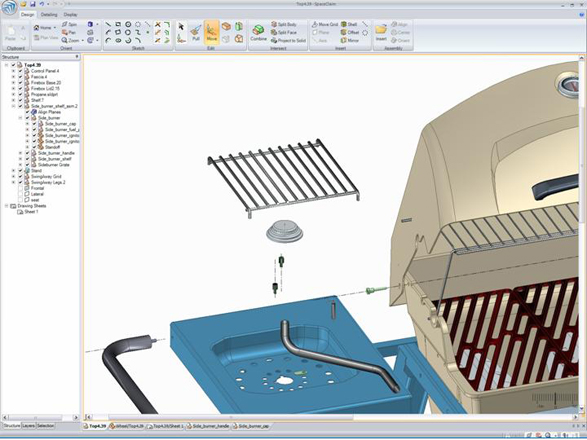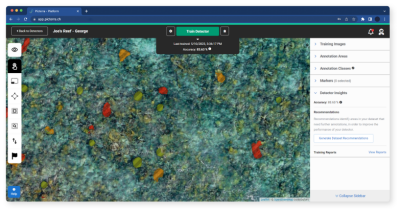If you’re involved in designing or modifying equipment or other mechanical products, take a look at SpaceClaim. We got a pre-release briefing from this Concord, MA startup that aims to set a new ease-of-use standard for mechanical 3D modeling. President and CEO Mike Payne, who previously helped start both PTC and SolidWorks, told us the company’s mission is to “put usable 3D at the fingertips of all engineers.” In some respects you might think of SpaceClaim as a kind of SketchUp for manufacturers.
Ease of learning and ease of use are key value propositions. “We have simplified the way to use 3D,” Payne says. Instead of history-based editing, SpaceClaim lets users modify a model by directly editing arbitrary cross-sections. An inferencing engine continually offers prompts and possible next actions. Part modeling and assembly modeling are done in one integrated environment. Design can proceed either top-down or bottom-up, in contrast to parametric modelers that generally mandate modeling a part, then more parts, then creating an assembly. Howie Markson, senior director of product marketing, says a typical user can be up to speed after a day and a half of training. All this is in contrast to history-based parametric modelers, Payne says, which generally require a user to understand how a model was constructed and constrained in order to edit it – this can make it difficult for one person to edit a model created by someone else.
SpaceClaim, which took the wraps off its product today, says it isn’t looking to compete with today’s parametric 3D modelers, but to complement them. SpaceClaim has direct translators for reading in 3D part and assembly data from CATIA V4 and V5, Pro/ENGINEER, UG NX, SolidWorks, Solid Edge and Autodesk Inventor. Users can edit the geometry, then send the edited model back to the CAD operator to use in updating the CAD model. SpaceClaim can export data in IGES, STEP and VDA, ACIS and Parasolid formats, and in CATIA V4 and V5 formats. The company says it often finds that CAD users refer to the SpaceClaim geometry to manually update their CAD model – to aid communication in these cases, the software includes 3D markup capabilities such as automatically showing old and new dimensional values and comparing geometry between versions.
The SpaceClaim software doesn’t create production drawings – again, that’s left to the CAD system. Open data access is another differentiator – SpaceClaim says its software stores data in XML format using the XML Open Packaging Convention.
Payne illustrated some possible use cases. A manufacturing engineer might receive a 3D model from a parametric CAD system, then use SpaceClaim to modify the design to make it more manufacturable and cheaper to produce. Analysts can use it to simplify models for input to analysis, reducing reliance on the CAD operator to make those changes. Quality engineers can review 3D models and give feedback in 3D to improve product quality. Engineers and engineering management can use SpaceClaim to originate or modify 3D designs for concept design, and to give feedback during design review.
We look forward to talking with users to find out how the new software measures up. Judging by who’s running SpaceClaim, its chances for success look strong. Mike Payne is a cofounder of both PTC and SolidWorks, and has been CEO of Spatial Corp., a Dassault Systèmes company, and CTO of Dassault Systèmes. Daniel Dean, VP of R & D, was PTC employee number two, taking a lead in creating the Pro/ENGINEER prototype and leading product development. Sales VP Rich Moore was previously CEO of IDe and also served a stint as VP and GM of Americas at industry pioneer Computervision. David Collard, CFO, has been CFO of Prime Computer and VP of finance and administration at Revit, among other positions.
The company has some heavy hitters on its board of directors too. In addition to Payne, directors include Mark Ain, founder and executive board chairman of Kronos Inc.; Steve Walske, former CEO of PTC; Richard Riff, Ford Technical Fellow, CAD/CAM/CAE and PLM, Ford Motor Company; Jesse Devitte (board observer), former VP of Softdesk (acquired by Autodesk), former Autodesk VP, now managing director and cofounder of Borealis Ventures; Richard D’Amore, partner with North Bridge Venture Partners; and Lou Volpe, managing general partner at Kodiak Venture Partners and a former PTC executive.
The licensing model is an annual subscription for either a one-year or three-year term. For a three-year commitment, price is $125 per month ($1500 per year) per seat. A one-year term is $2000 per year. Subscription includes an extra copy for home use. Data exchange packages for specific CAD systems are extra. The company will also offer a free student version and a view-only version.
The software is designed for Windows Vista and has the Office 2007 look and feel. It’s also Windows XP-compatible – the company reports no difference in performance between Vista and XP versions.
Distribution channels are online sales to small companies, value-added resellers for mid-sized companies, and direct sales to large accounts.
SpaceClaim will face challenges, to be sure. Claims of breakthroughs in 3D ease-of-use have been made before, but none of those has found success on anything like the scale of a SolidWorks or a PTC. SpaceClaim will likely have to overcome some skepticism because of this.
SpaceClaim was founded in September 2005. The prototype software was created by longtime industry members David Taylor and Blake Courter. The company’s first round of venture financing total $7.5 million, led by Kodiak Venture Partners and North Bridge Venture Partners.
In development since December 2005, SpaceClaim Professional 2007 Edition is scheduled to ship March 30, 2007.






